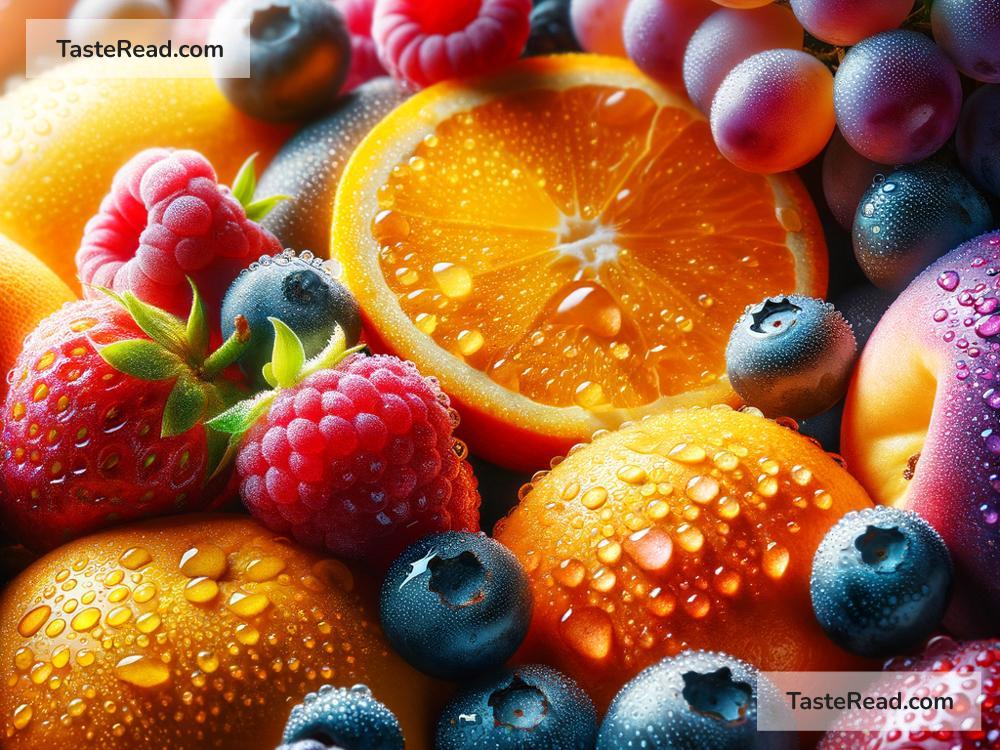The Role of Antioxidants in Fruit Taste
Fruits are nature’s candy. They’re sweet, juicy, and bursting with flavor. But did you know that antioxidants play a big role in how fruits taste? These tiny, powerful molecules don’t just help your body; they also help shape the delicious flavors we enjoy in fruits. Today, we’ll explore the fascinating connection between antioxidants and fruit taste—all in simple, easy-to-understand terms.
What Are Antioxidants?
First, let’s talk about what antioxidants are. Antioxidants are natural compounds found in many foods, like fruits, vegetables, tea, and even chocolate. Their main job is to fight free radicals—unstable molecules that can damage your cells. Think of free radicals as little troublemakers inside your body, and antioxidants as the superheroes who stop them.
But antioxidants don’t just keep you healthy. They also have a big impact on fruits, from their taste to their color and even their smell.
How Do Antioxidants Affect Fruit Taste?
Fruits get their flavors from a mix of sweet, sour, and sometimes bitter tastes. Antioxidants, along with other substances like sugars, acids, and aromas, help create this mix. Here’s how antioxidants factor into the taste equation:
-
Bitterness and Astringency: Some antioxidants, like tannins, add bitterness or a dry, puckery feeling when you eat certain fruits. For example, unripe bananas or persimmons can taste bitter or make your mouth feel dry. This is because they contain tannins, a type of antioxidant. As fruits ripen, tannins break down or interact with sugars, making the fruit taste sweeter and less bitter.
-
Sweetness Enhancement: While antioxidants themselves aren’t sweet, they often protect and support other compounds in fruits, like natural sugars. For instance, vitamin C, a well-known antioxidant found in oranges and strawberries, plays a role in balancing sweetness and acidity. It lets the fruit’s sweetness shine, while keeping it fresh and tangy.
-
Aroma and Flavor Depth: Antioxidants can influence a fruit’s smell and overall flavor profile. For example, polyphenols (a type of antioxidant) are responsible for the complex, rich flavor of berries like blueberries and blackberries. These polyphenols interact with other compounds in the fruit, creating bold, memorable flavors that make berries stand out.
-
Ripening and Maturity: Antioxidants also help determine when fruits are ready to eat. As fruits mature, antioxidant levels shift, alongside their sugars and acids. Imagine biting into an unripe mango–it’s sour and bland. But when it’s ripe, the antioxidants work with the fruit’s sugars to create a sweet, tropical flavor. Timing matters!
Why Are Antioxidants Important for Fruit Freshness?
Ever wondered why fruits go bad after a few days? Oxygen is partly to blame. When fruits are exposed to air, free radicals start to damage their cells, causing them to lose flavor and freshness. This process is called oxidation.
Antioxidants help slow down this oxidation process. For example, vitamin C keeps fruits fresh longer by fighting off free radicals. That’s why lemon juice is often used to prevent sliced apples or avocados from turning brown. The antioxidants in lemon juice act like a shield against spoilage.
Color and Taste Go Hand in Hand
The colorful skin of fruits —whether it’s the bright red of strawberries or the deep purple of grapes—is often a clue about their flavor. Many of these vibrant colors come from antioxidants like anthocyanins and carotenoids.
Anthocyanins, which give fruits like blueberries and cherries their blue and red hues, also contribute to their bold, tangy flavor. Meanwhile, carotenoids, found in fruits like papayas and mangoes, add a hint of sweetness and a rich, tropical taste. In short, the antioxidants that make fruits beautiful also make them delicious.
Antioxidants and Your Health: A Bonus Benefit
Besides shaping fruit flavors, antioxidants also make fruits excellent for your health. Eating antioxidant-rich fruits can help protect your body from illnesses like heart disease, cancer, and aging. That’s why fruits are often called “superfoods.”
For example, the antioxidant vitamin C strengthens your immune system, while polyphenols in dark-colored fruits can improve brain function. So, when you enjoy a bowl of fresh fruit, you’re not just savoring great flavors—you’re also giving your body some top-notch nutrition.
Conclusion: Antioxidants Are the Flavor Masters
The next time you bite into a juicy strawberry or crunch on an apple, take a moment to appreciate the antioxidants at work. They’re behind the sweetness, tanginess, and even the ripeness of your favorite fruits. These remarkable compounds are like little chemists, mixing flavors while keeping fruits fresh and tasty.
Antioxidants don’t just benefit your health; they make sure fruits taste as amazing as they look. So, whether you’re snacking on berries, sipping on a smoothie, or adding fruit to your salad, remember to thank antioxidants for their role in creating nature’s delicious masterpieces!


